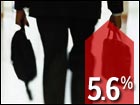|
Unemployment falls to 5.6%
|
 |
February 1, 2002: 11:12 a.m. ET
Unemployment rate fell in January while consumer sentiment surged.
|
NEW YORK (CNN/Money) - The nation's unemployment rate dropped unexpectedly in January as employers reduced payrolls at the slowest pace since before the Sept. 11 attacks, the government said Friday.
The jobless rate fell to 5.6 percent in January from 5.8 percent in December as employers cut 89,000 jobs from payrolls versus a revised loss of 130,000 jobs a month earlier. Job losses averaged 311,000 a month in the last three months of 2001.
Separately, the nation's purchasing managers said a key gauge of manufacturing rose for the third straight month in January, a sign the sector may be poised to emerge from its 18-month slump.
And a popular gauge of consumer sentiment rose to 93 in January from 88.8 in December, sources told Reuters. The January reading from the University of Michigan came in shy of analysts' forecasts of 94.2, according to Briefing.com.
|  | |
 |
 |
 |
| |
 CNNfn's Tim O'Brien reports on unemployment numbers.
CNNfn's Tim O'Brien reports on unemployment numbers.
| |
 |
Economists had forecast unemployment would creep up to 5.9 percent and that payrolls would shrink by 50,000 in January.
"It is certainly a mixed bag ... but I don't think it changes the broader picture that the worst for the economy is over and that we are slowly turning the corner," Doug Porter, senior economist at BMO Nesbitt Burns, told Reuters.
Porter and other analysts said the recession that began last March could be ending. The government reported this week that the U.S. economy managed to grow at a 0.2 percent rate in the fourth quarter, fueling hopes of recovery.
But Labor Department officials cautioned against reading too much into January's positive employment news. January tends to reflect large seasonal movements after the holidays, and that can skew the outlook on the job market.
"Obviously the payroll number was a little bit weaker, but the unemployment number was better than expected," said Anthony Chan, chief economist with Banc One Investment Advisors.
On Wall Street, stocks were mostly lower as investors had factored in the signs of improvement in the economy.
The reports come two days after the Federal Reserve decided to leave interest rates alone following 11 consecutive cuts -- a sign to many that the economy may be poised for a rebound.
In its accompanying statement, the Fed cautioned that signs still point to economic weakness, leaving the door open to future rate cuts. But the nation's central bank sounded considerably more upbeat than in recent times, saying "the outlook for economic recovery has become more promising."
The Fed started cutting rates 13 months ago as consumers began turning cautious and employers accelerated job-cutting to boost weak bottom lines. The Sept. 11 terrorist attacks added to consumer nervousness heading into the holiday season, which turned out to be one of the most disappointing for retailers in a decade. Consumer spending is key as it fuels two-thirds of the economy.
Still, analysts have said unemployment is likely to continue rising even as the economy rebounds, since employers hesitate to start hiring until after the rebound gains strength. Companies have cut payrolls by 1.4 million since last March, which is when a panel of prominent economists say the recession started.
Employment in manufacturing, which has been hardest hit by the downturn, fell by 89,000 jobs in January, compared with average losses of 137,000 a month during the fourth quarter of 2001.
Construction jobs fell by 54,000 despite unseasonably warm weather, which usually benefits the industry. Service industry jobs such as those at hotels and computer services, badly impacted by the Sept. 11 terrorist attacks, were unchanged after dropping by 192,000 in the fourth quarter.
Transportation and public utilities jobs were also unchanged after the sector slashed 211,000 jobs over the past seven months.
Meanwhile, average hourly earnings were unchanged in January at $14.59. 
|
|
|
|
|
|

|

